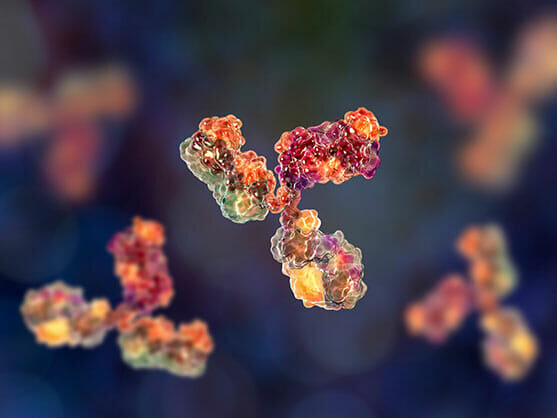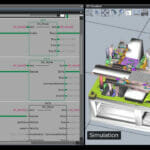AMSBIO announce a new rabbit and mouse recombinant monoclonal antibody development service based upon a revolutionary technology platform. The DimAb™ development platform is different from traditional hybridoma fusion technologies in that it can directly isolate IgG genes from B cells of immunized animals. Using this novel platform – a number of custom development projects have already been completed with high customer satisfaction.
Comparing with other animals, rabbits have a unique B cell development process that is more distant from the human development process compared to rodents. Rabbit B cells utilize a dual affinity maturation mechanism combining gene conversion and somatic hypermutation. Additionally, rabbit IgG has a unique protein structure, including one subtype of IgG. These differences enable rabbits to produce antibodies with higher affinity and wider diversity. As a consequence, in recent years, rabbit monoclonal antibodies have gained popularity for a range of immunological assay developments, especially for pathology applications. On October 8th 2019, the first rabbit monoclonal antibody derived drug Beovu® was approved by the FDA for the treatment of wet age-related macular degeneration (AMD).
In the past, rabbit monoclonal development technology required a patent protected rabbit myeloma cell line, which limited its applications in many areas. Today, AMSBIO’s new DimAb technology platform provides a great technological breakthrough in this area. Without using myeloma cells, AMSBIO can directly isolate IgG genes from positive B cell clones. This not only enables shorter development times, but also allows direct acquisition of IgG genetic coding information.
Although mouse hybridoma technology was developed several decades ago, it is still the major working horse people commonly using for monoclonal antibody development. However, there are limitations in the preparation of monoclonal antibodies by traditional hybridoma methods, such as low fusion efficiency of hybridoma, long preparation process, unstable hybridoma cells. The revolutionary DimAb™ technology platform for mouse monoclonal antibody platform from AMSBIO offers a range of significant advantages including shorter development times, high project success rate, high cloning efficiency, direct acquisition of antibody IgG gene sequence, high batch-to-batch consistency and using PMBCs does not require animals to be killed.
For further information on our custom rabbit and mouse recombinant monoclonal antibody development service using the DimAb™ development platform please visit https://www.amsbio.com/recombinant-mouse-rabbit-monoclonal-antibody-service/ or contact AMSBIO on +44-1235-828200 / +1-617-945-5033 / [email protected]. To learn more about AMSBIO’s full range of monoclonal antibody products and services please visit https://www.amsbio.com/products/antibodies/monoclonal.
Founded in 1987, AMS Biotechnology (AMSBIO) is recognized today as a leading transatlantic company contributing to the acceleration of discovery through the provision of cutting-edge life science technology, products and services for research and development in the medical, nutrition, cosmetics and energy industries. AMSBIO has in-depth expertise in extracellular matrices to provide elegant solutions for studying cell motility, migration, invasion and proliferation. This expertise in cell culture and the ECM allows AMSBIO to partner with clients in tailoring cell systems to enhance organoid and spheroid screening outcomes using a variety of 3D culture systems, including organ-on-a-chip microfluidics. For drug discovery research, AMSBIO offers assays, recombinant proteins and cell lines. Drawing upon a huge and comprehensive biorepository, AMSBIO is widely recognised as a leading provider of high-quality tissue specimens (including custom procurement) from both human and animal tissues. The company provides unique clinical grade products for stem cell and cell therapy applications these include high quality solutions for viral delivery (lentivirus, adenovirus and adeno-associated virus) in addition to GMP cryopreservation technology




